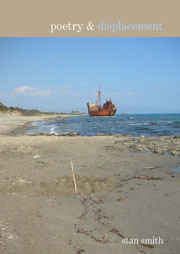Book contents
- Frontmatter
- Contents
- Acknowledgements
- 1 Introduction: Poetry, Place and Displacement
- 2 On the Edge of Things: Philip Larkin
- 3 A Double Man in a Double Place: Iain Crichton Smith
- 4 Salvaged from the Ruins: Ken Smith's Constellations
- 5 Lost Bearings: Christopher Middleton
- 6 ‘What Like Is It?’ Carol Ann Duffy's Différance
- 7 Darkening English: Post-imperial Contestations in Seamus Heaney and Derek Walcott
- 8 Living in History
- 9 An Age of Simulation: Tall Tales and Short Stories
- 10 Nowhere Anyone Would Like To Get To
- 11 Milking the Cow of the World: Displacement Displaced
- Notes
- Bibliography
- Index
3 - A Double Man in a Double Place: Iain Crichton Smith
- Frontmatter
- Contents
- Acknowledgements
- 1 Introduction: Poetry, Place and Displacement
- 2 On the Edge of Things: Philip Larkin
- 3 A Double Man in a Double Place: Iain Crichton Smith
- 4 Salvaged from the Ruins: Ken Smith's Constellations
- 5 Lost Bearings: Christopher Middleton
- 6 ‘What Like Is It?’ Carol Ann Duffy's Différance
- 7 Darkening English: Post-imperial Contestations in Seamus Heaney and Derek Walcott
- 8 Living in History
- 9 An Age of Simulation: Tall Tales and Short Stories
- 10 Nowhere Anyone Would Like To Get To
- 11 Milking the Cow of the World: Displacement Displaced
- Notes
- Bibliography
- Index
Summary
Between two worlds
Iain Crichton Smith, born in 1928, grew up in the Gaelic-speaking village of Bayble on the Isle of Lewis, went to university in Aberdeen, and spent much of his life as a schoolteacher in Clydebank and Oban. He has been the only contemporary Scottish writer to span the linguistic West Highland fault, writing poetry and prose in both English and Scottish Gaelic. In a 1980 introduction to a selection of his poems, ‘A Poet in Scotland’, he described bilingualism as one of the ‘more disabling choices available’ to a writer, ‘But then sometimes it is a good thing to have two languages.… I can look out of two windows instead of one, and each language refreshes the other’. He wrote there of the almost inevitable disregard with which even ‘the very great poetic genius’ of Hugh MacDiarmid is treated by the English literary establishment, as ‘someone on the edge of things [who] will never enter the main channel of that sea on which literary critics brood’. In a 1984 essay he deferred to the Gaelic poet Sorley MacLean as the ‘Gaelic Master’. In his essay ‘The Double Man’, however, he spoke of these two poetic father figures primarily as the horns of an irresolvable dilemma:
The two major poets of this century in Scotland are MacDiarmid and Sorley MacLean. These poets wrote their best work in a language other than English. […]
- Type
- Chapter
- Information
- Poetryand Displacement , pp. 41 - 55Publisher: Liverpool University PressPrint publication year: 2007



